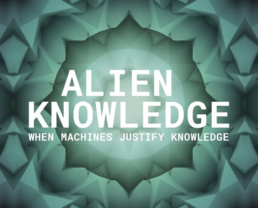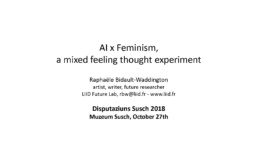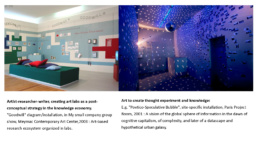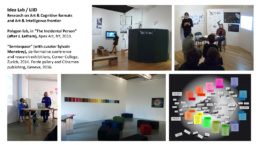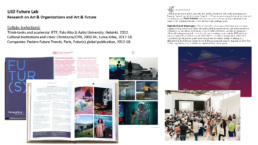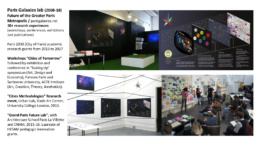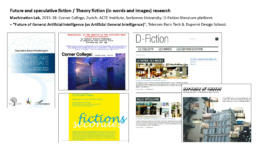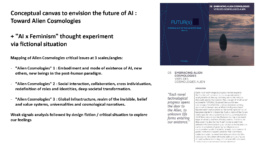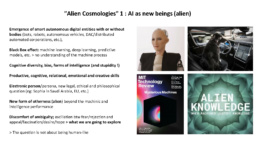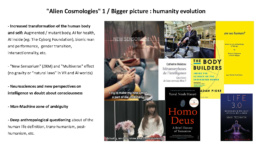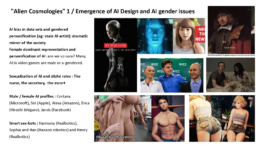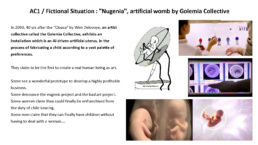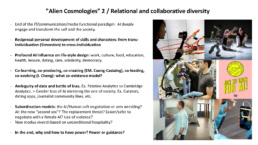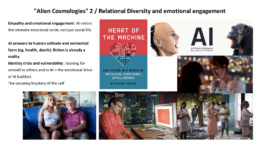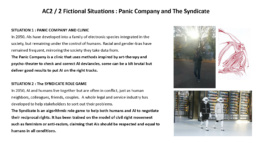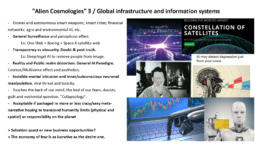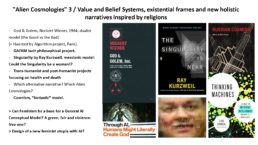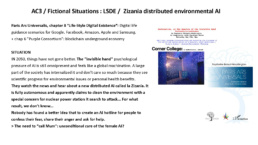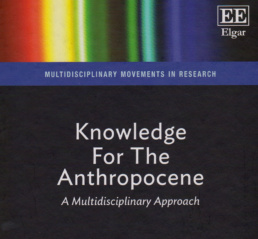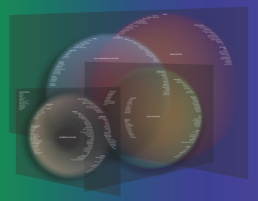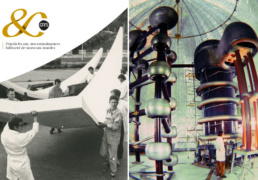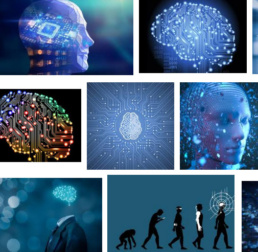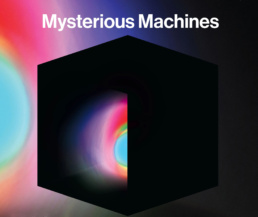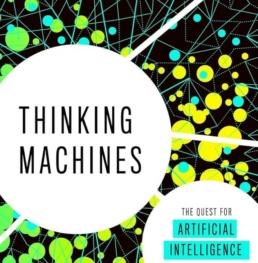Do They Dream of Electric Sheep?, Muzeum Susch, Suisse, 2018
AI x Feminism
a mixed feeling thought experiment
Disputaziune #2 « Do They Dream of Electronic Sheeps » (Curator: Mareike Dittmer), Muzeum Susch, Suisse, 2018.
Cette keynote est l’occasion de reformuler de manière très synthétique les enjeux multi-scalaires de l’IA depuis leur ambiguïté ontologique jusqu’au défis planétaires, puis d’adresser plus spécifiquement la question du genre, en s’appuyant sur de nombreux ‘signes du futur’ ainsi que sur les expériences fictionnelles du lab réalisé cette même année.-
Biais genrés des algorithmes et du machine learning accentuant les inégalités et les clichés, féminisation archétypale des interfaces de l’IA favorisant leur acceptabilité, sexbots augmenté d’IA, reproduction humaine optimisée ou remplacée par l’IA, IA ersatz de la relation amoureuse ou du besoin d’amour universel…
-
Les enjeux de l’IA qui se jouent en miroir de ceux de l’humanité, permettent de revisiter sous un nouvel angle toutes les problématiques du genre, et de mobiliser les philosophies féministes à l’endroit des technologies et notamment de leur subordination.
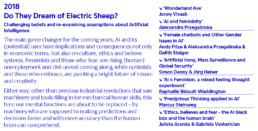
Following a series of recent researches about the future of AI and its specific ecology of affects, I would like to create and share a new thought experiment, to highlight critical issues, address ambiguities and play with paradoxes at the cross-road of AI and Feminism. The discursive perambulation will set and navigate a broad almost vertiginous, cognitive panorama, mirroring the one of AI.
RBW
Slides de l'intervention
A propos de Dispataziune Susch #2 "Do They Dream of Electric Sheep"?
Challenging beliefs and re-examining assumptions about Artificial Intelligence
The main game changer for the coming years, AI and its (potential) uses have implications and consequences not only in economic terms, but also on culture, ethics and believe systems. Pessimists and those who fear, see rising (human) unemployment and civil unrest coming along, while optimists and those who embrace, are painting a bright future of leisure and creativity.
Either way, other than previous industrial revolutions that saw machinery and tools filling in for mechanical human skills, this time our mental functions are about to be replaced – by machines who are supposed to making predictions and decisions faster and with more accuracy than the human brain can comprehend.
The scale of this challenge has not fully arrived with government agencies, business leaders and scientists, and it seems essential to think about frameworks and regulations that would accompany this change before it settles without other leading forces than the profit-making of the tech industries. Algorithmic deficiencies based on the biases of the programmers need to be identified and a code of conduct as well as greater diversity among the engineers and computer scientists developing AI could go a long way toward minimizing these biases.
To quote Marina Gorbis, executive director of the Institute for the Future: “We need technologists who understand history, who understand economics, who are in conversations with philosophers, we need to have this conversation because our technologists are no longer just developing apps, they’re developing political and economic systems.” These are very present issues that need to be urgently addressed, since the technologies become more prevalent.
Thus, we want to bring diverse speakers from science, art, academia, tech and economy together to analyse the factual status of AI, its impact and its possible futures, and to discuss agencies broaching the mysticism of both technological and artificial power structures, the changing narratives in the human machine discourse and the transfer of gender imbalances from the physical to digital worlds:
Can empathy be programmed and what is it to be human? Does it matter that AI is 95% coded by men? Do we replace the Deus ex Machina with machines with godlike attributes? What holds believes?
By taking facts to arguments and charging them with tension we will intensify the energy thinking holds and playfully expand realities.
Rappel des axes de recherche du lab
Axe 1 : Transitions et Mondes Futurs
Axe 2 : Innovation Méthodologie Prospective
Axe 3 : Art et Recherche Prospective
Articles associés à celui-ci
Designing Post-Human Futures, Knowledge for the Anthropocene, 2021
Ce long essai est une première ébauche des intentions méthodologiques du TAC Future Lab convoquant notamment la pensée…
Symposium ‘Prototyping Futures’, Cercle ‘Cybiosis’, NSU, Diffrakt, Berlin, 2020
Cette intervention est l’occasion de préfigurer, partager et échanger autour d’une première ébauche du TAC Future…
Nos Connaissances bâtissent de Nouveaux Mondes, 80 ans du CNRS, Paris, 2018-19
Ce ‘futur lab’ au sein de la Direction de la Communication du CNRS avait vocation à aider toute son équipe (20…
Futur x IA x Design Spéculatif, Ecole Duperré, Paris, 2018
Dans ce cycle d’atelier sur le futur de/avec l’IA, les étudiants sont initiés à la recherche par l'image, aux enjeux…
Futur de l’Intelligence Artificielle Générale, Forccast, Telecom ParisTech, 2018
Développement pour une équipe de recherche du programme FORCCAST, d’un ensemble de fictions spéculatives sur le futur…
Vers des Cosmologies Alien, Cahier FUTUR(S), Peclers, 2017
C'est dans le prestigieux et très influent cahier FUTUR(S) que Raphaële Bidault-Waddington énonce pour la première fois…
